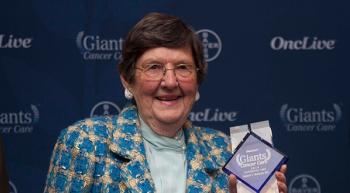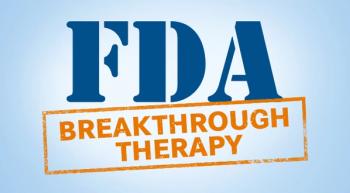
Immunotherapy alone has not shown much success in treating ovarian cancer, despite success with other cancers, so researchers are now testing combinations of immunotherapy drugs with other agents to see if it enhances effectiveness.

Immunotherapy alone has not shown much success in treating ovarian cancer, despite success with other cancers, so researchers are now testing combinations of immunotherapy drugs with other agents to see if it enhances effectiveness.

Some underprivileged and minority groups are underrepresented in lung cancer clinical trials, which can affect how and whether they receive appropriate care.

The first large, multicenter trial to investigate the effect of acupuncture in treating aromatase inhibitor-induced joint symptoms in women with breast cancer reported a statistically significant reduction in pain with acupuncture use.

Trastuzumab (Herceptin) did not reduce cardiac function in women with node-positive, HER2-positive, early-stage breast cancer, according a study published in the Journal of Clinical Oncology.

Based on impressive results from the phase III NETTER-1 trial, the FDA has approved Lutathera (lutetium [177Lu] oxodotreotide) for the treatment of patients with somatostatin receptor-positive gastroenteropancreatic neuroendocrine tumors (GEP-NETs).

The common skin cream fluorouacil 5%, when applied for 2 to 4 weeks, has been shown to reduce the risk for squamous cell carcinoma for up to a year, according to a study published in JAMA Dermatology.

Oral mucositis is a common, sometimes debilitating side effect of cancer treatment. There is hope, however, in the form of a drug now in development, that could significantly treat and reduce it.

The year 2017 saw significant advancements in the field of bladder cancer treatment. Five Food and Drug Administration (FDA) approvals for checkpoint inhibitors in both the first and second line setting opened up the immunotherapy landscape, and more develoments are on the way.

There is a growing subgroup of people with cancer who have survived a prior cancer. Often, these patients are excluded from clinical trials and underrepresented in research, researchers noted.

Researchers conducted a meta-analysis of data from 61 studies to determine whether people who stay up all night for work have an increased risk of developing cancer.

Daratumumab (Darzalex) in combination with bortezomib (Velcade), melphalan, and prednisone (VMP), has been granted a priority review designation by the FDA for patients with newly diagnosed multiple myeloma who are ineligible for autologous stem cell transplant.


The oldest known cases of multiple myeloma and breast cancer have been discovered in two Egyptian mummies which were found in the pharaonic necropolis of Qubbet el-Hawa in Aswan, Egypt.

Impressive overall survival (OS) data from the phase III ENDEAVOR trial inspired the FDA to approve a supplemental new drug application to add it to the label for carfilzomib (Kyprolis) for use in patients with relapsed or refractory multiple myeloma.

Results of a large study showed that postmenopausal women who lost 5% or more of their body weight were 12% less likely to develop breast cancer than those whose weight remained stable; those who lost 15% or more reduced their risk by 37%.

A supplemental biologics license application for the CAR T-cell therapy tisagenlecleucel (Kymriah) has been granted a priority review by the FDA for use in adult patients with relapsed/refractory diffuse large B-cell lymphoma (DLBCL) who are ineligible for or relapse after autologous stem cell transplant.

Jimmie C. Holland, MD, known as the mother of psychosocial oncology, died last month at the age of 89. The oncology community has lost a pioneer in the integration of humanity into cancer care.

The FDA approved a new first-line treatment combination for patients with newly diagnosed low-risk acute promyelocytic leukemia (APL).

The Food and Drug Administration (FDA) estimates that the market for homeopathic drugs is about $3 billion. In an effort to crack down on the industry, the FDA announced a new, risk-based approach to regulating homeopathic treatments.

Approval opens up treatment possibilities for lung cancer patients with rare genetic mutations.

Cisplatin, a platinum-based chemotherapy agent that is used to treat testicular cancer, non-small cell lung cancer, bladder cancer, cervical cancer, ovarian cancer and head and neck cancer, has been found to cause a significant amount of hearing loss in patients, according to a recent article published in Nature Communications.

Based on results from the phase III OlympiAD trial, the FDA approved olaparib (Lynparza), a PARP inhibitor, for the treatment of patients with germline BRCA-positive, HER2-negative metastatic breast cancer who have previously received chemotherapy. HR-positive patients must also have had prior endocrine therapy.

Blueberries are known as a "superfood" because of the rich essential vitamins and minerals they provide. Research now shows they may also help to treat cancer.

Only a quarter of patients who have brain cancer enroll in hospice care with enough time to benefit from the comfort, symptom management and emotional support it can provide, a new study shows.

Patients diagnosed with thyroid cancer before the age of 40 appear to be at the highest risk for age-related diseases, including heart disease and diabetes, compared with their age-matched counterparts.

Though women presenting with breast pain are often sent by their clinicians for different types of breast cancer testing — typically undergoing mammography, an ultrasound, and a physical exam — a new study reveals that breast pain is not necessarily an indicator of cancer.

The FDA has granted a breakthrough therapy designation to the combination of pembrolizumab (Keytruda), a PD-1 inhibitor, and lenvatinib (Lenvima), a VEGF/FGF inhibitor, for the treatment of patients with advanced and/or metastatic renal cell carcinoma (RCC).

NextSource Pharma has raised the price of oral chemotherapy agent lomustine (Gleostine) by 1400% since acquiring the drug, which is used to treat Hodgkin lymphoma and glioblastoma, from Bristol-Myers Squibb in 2013.

Carfilzomib, commonly used to treat patients with multiple myeloma, may lead to an increased risk of cardiovascular events.

Denosumab (Xgeva), a RANK ligand inhibitor, has been approved by the FDA for the prevention of skeletal-related events (SREs) in patients with multiple myeloma.